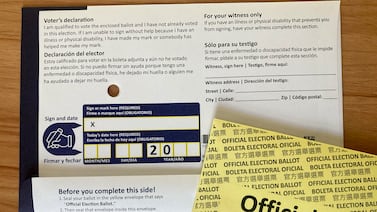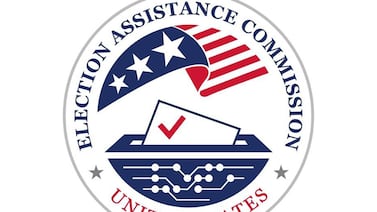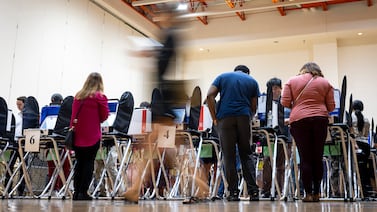Votebeat is a nonprofit news organization reporting on voting access and election administration across the U.S. A version of this post was originally distributed in Votebeat’s free weekly newsletter. Sign up to get it delivered to your inbox every Saturday.
After the 2020 redistricting cycle, a set of local political maps stood out to voting rights advocates and the U.S. Department of Justice: Galveston County, Texas. Now, the lawsuit over those maps has taken an interesting twist, and it highlights the way long standing legal precedents are under challenge right now.
First, the backstory: Galveston County used redistricting to break up the sole majority-minority district for its commissioners court, thrusting Black and Latino voters into majority-white districts where they would have no real opportunity to elect their candidates of choice. The lawsuit over Galveston County’s redistricting became the first local redistricting case this cycle to prompt the U.S. Department of Justice to intervene.
Last month, the plaintiffs won a decisive victory. A federal judge ruled the county’s redistricting violated the Voting Rights Act, and, in a 157-page ruling, made clear it wasn’t an especially close call.
“This is not a typical redistricting case. What happened here was stark and jarring,” wrote the U.S. District Court Judge Jeffrey Brown, a former state Supreme Court justice who was nominated to the federal bench in 2019 by former President Donald Trump. “Looking at the totality of the circumstances, it was a clear violation of § 2 of the Voting Rights Act. And it must be overturned.”
Brown ordered new maps in Galveston. The county — predictably — appealed, arguing it hadn’t violated the Voting Rights Act. And here’s where things get a little less predictable.
A three-judge panel on the U.S. Court of Appeals for the 5th Circuit, by most measures the most conservative appellate court in the country at the moment, unanimously affirmed Judge Brown’s ruling, finding it was correct under the law.
Brown also correctly abided by a precedent set by the 5th Circuit itself decades ago, in which the court decided that Black and Latino voters can be combined for the sake of the legal analysis, as long as they vote cohesively. In other words, if there aren’t enough Black voters or Latino voters, or voters of another protected class, to make up a majority of the district by themselves, they can be put together when plaintiffs can show their political interests align.
That’s what happened in Galveston. The panel of 5th Circuit judges acknowledged that plaintiffs met the tests to proceed with the lawsuit on behalf of what, in legal jargon, is referred to as a “coalition claim.”
But there’s a but.
The 5th Circuit panel, it turns out, isn’t so sure that the long-standing precedent was, in fact, decided correctly by the 5th Circuit, an issue Galveston had raised.
“[T]his panel is bound by it under the rule of orderliness,” they wrote, “But the court’s decisions in this respect are wrong as a matter of law.”
The panel affirmed the district court order, requiring new maps, but first, it wants to poll all the judges on the 5th Circuit to see if a majority want to hold what’s known as an en banc hearing, to revisit that decades-old precedent, “at the earliest possible date.”
So where does that leave the voters of Galveston County, who need new commissioner district maps pretty quickly, since the 2024 election is coming up fast?
“At the current moment, everything the district court said is stayed,” said Mark Gaber of the
Campaign Legal Center, who represents some of the plaintiffs in the case, though he said he expects the 5th Circuit to move relatively quickly. Still, he said, it’s hard to be sure what will happen.
“It’s not usual to see a six-page affirmance saying, ‘We wish we didn’t have to do this,’” he said, adding, “The facts are so clear-cut, the only way out is if the law doesn’t allow this.”
Michael Li of the Brennan Center for Justice at NYU Law, a redistricting expert, said the precedent is a straightforward one, and if the 5th Circuit decides to move forward with an en banc hearing, “it’s probably not a very good sign.”
Earlier this year, defying expectations, the Supreme Court issued a strong ruling upholding voting rights precedents in another voting rights case, this one out of Alabama. The decision was celebrated by voting rights advocates, but challenges to precedents haven’t ended. In addition to the Galveston case, for example, Louisiana last week signaled it plans to bring another challenge to the constitutionality of the Voting Rights Act in connection with its redistricting.
Li acknowledged the country is in a moment where voting rights laws and precedents are “potentially changing,” and points out the current Supreme Court is upending precedents in many areas. Just because the justices didn’t do so in the Alabama case doesn’t mean changes aren’t coming, in other words.
“You could do it in a big way,” he said, “or you could do it in death by a thousand cuts.”
A heads up: Happy Thanksgiving from Votebeat! We’re taking next week off from this newsletter for the holiday. We’ll be back on Dec. 2 with our usual analysis of important voting news.
Back Then
Want to read more about redistricting? Check out this 2012 article from the Atlantic, “The League of Dangerous Mapmakers,” for a look at how the process has been manipulated for centuries for political advantage.
New From Votebeat
From Votebeat Arizona: Mohave County supervisors to decide on hand-counting ballots in 2024
From Votebeat Texas: Harris County election shows progress. But challenges remain ahead of 2024.
In Other Voting News
- In a leaked videotaped interview, a onetime lawyer for former President Donald Trump told prosecutors that a top presidential aide told her Trump would not leave the White House “under any circumstances,” the Washington Post reported. The videotape of lawyer Jenna Ellis was made in connection with a Georgia case related to efforts to overturn the 2020 election.
- The New Georgia Project, a high-profile voting rights nonprofit in Georgia started by former Democratic gubernatorial candidate Stacey Abrams, is conducting an internal probe in response to questions about financial irregularities and misuse of funds and fired its executive director, Politico reported.
- Social media company Meta will allow its platforms, including Facebook and Instagram, to host ads questioning the legitimacy of the 2020 election, a change in policy first reported by the Wall Street Journal.
- Pennsylvania’s Jewish community is still lobbying to move the state’s 2023 primary election to a date other than the first full day of Passover, April 23, when many religious Jews will be unable to cast a ballot, KDKA reported. State lawmakers have considered proposals to move it, but hit an impasse last month and time to do so is running short.
Carrie Levine is Votebeat’s story editor and is based in Washington, D.C. She edits and frequently writes Votebeat’s national newsletter.Contact Carrie at clevine@votebeat.org.








